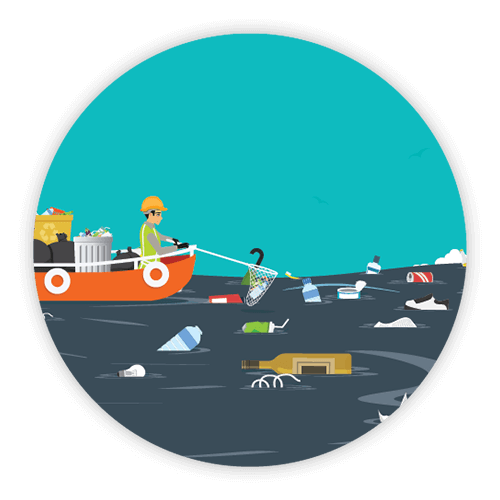Consequences of Poorly Managed RMW

Regulated medical waste (RMW) isn’t particularly pretty and neither are the consequences of mismanaging it.
The initial consequence that everyone thinks of is: money, fines, penalites, the big uh-oh bill. In addition to financial consequences, medical waste generators may also face legal repercussions for noncompliance for hazardous waste disposal. Every healthcare facility - regardless of size - is responsible for adhering to federal and state guidelines when it comes to segregation, collection, and disposal of regulated medical waste. Daniels Health is here to make healthcare safer and assist in your waste disposal program.
What exactly is defined as regulated medical waste? We have already covered this and a few other waste streams in our Definitive Guide to Medical Waste, but in case you skipped that one - The Environmental Protection Agency (EPA) defines regulated medical waste as any type of waste generated in the performance of healthcare facilities (human and animal) that may potentially be contaminated by body fluids, blood, or other infectious materials. This is often referred to in casual terms as “red bag waste.”
Regulations can be confusing due to the number of governmental agencies involved in medical waste disposal.
“I want to speak to the person in charge! Give me the manager! Who governs regulated medical waste!?
- Environmental Protection Agency (EPA)
- Department of Transportation (DOT)
- Occupational Safety and Health Administration (OSHA)
- Centers for Disease Control (CDC)
- US Food and Drug Administration (USFDA)
State guidelines and regulations also apply. It would behoove you to research your state. You probably know the state flower, but do you know what to do with those bloody gauze?

Financial consequences of ignoring the rules
Ignoring rules regarding the proper healthcare waste segregation and disposal of numerous types of regulated medical waste – biohazard waste disposal, improper handling of infectious waste, or improper sharps container usage and disposal - are serious. Fines for poorly managed regulated medical waste can exceed tens of thousands, and venture into hundreds of thousands of dollars in fines and penalties that are designated for each infraction, and those penalties can accumulate for every day that the medical waste generator remains noncompliant. No one has the coin for those kinds of fines—let’s avoid them all together, okay? Okay.
In 2015, a Kaiser hospital facility was fined nearly $150,000 by OSHA after several employees suffered sharps injuries after needles had been improperly disposed of in a biomedical waste collection box, instead of a compliant sharps disposal container. Daniels Health has a no-touch Safety Engineered Device for sharps disposal that reduces the risk of sharps-related injuries by over 80%. Love yourself and love your employees—eliminate of the possibility of sharps injuries.
Penalties in New Jersey for improper disposal of regulated medical waste streams are severe, and fines in excess of $450,000 are not unheard of. When it comes to pharmaceutical waste disposal, additional agencies - in addition to those mentioned above – are also involved and include:
- The Drug Enforcement Agency
- The Joint Commission
- Publicly owned treatment works
Each has the power to mandate fines and penalties for poorly managed regulated medical waste. Some of the most common issues involved with poorly managed medical waste involve:
- incorrect or noncompliant determinations and/or segregation of hazardous waste streams
- incorrect or incomplete hazardous waste labeling
- improper disposal of pharmaceutical waste including chemotherapy drugs
- or inadequate documentation and/or lacking hazardous waste manifest
- improper and/or lacking proper management of expired pharmaceuticals
The Department of Transportation also specifies regulations including the classification, packaging, description, and adequate labeling and marketing of medical waste. That government agency also mandates adequate segregation into proper waste streams, and require compliance with the Hazmat Materials Transportation Act. When violations occur, average fines often range $30,000 per violation or up to $100,000.
OSHA compliance is essential as well, with the agency imposing fines that range anywhere from $7,000 to $70,000 for "willful and serious" violations of blood borne pathogen training standards for employees. This is why Daniels Health stresses that our partners take the Department of Transportation: RMW training in our Compliance Portal as soon as possible.
In 2017, fines for medical waste generators nearly doubled in one year, especially in regard to violations associated with the Resource Conservation and Recovery Act (RCRA). According to the EPA, every violation, may reach a maximum civil penalty of approximately $70,000 - for every day that the violation occurs.
Regulations and fines are not only delivered by the EPA, but fines from other government organizations may also be applicable. For example, fines (on a daily basis) may average:
- Clean Air Act: $93,750
- Clean Water Act: $51,570
- Toxic Substances Control Act Violations: $37,500
No size of facility is exempt from the financial consequences of mismanaged regulated medical waste. Take this seriously. You read all those fines—no one has room for that in their budget.

Legal problems associated with improper medical waste disposal
When regulatory standards for hazardous waste disposal - or for any type of regulated waste disposal - are not followed, legal repercussions are just around the corner waiting with their briefcase, papers, and staring menacingly. Medical waste generators and the medical waste disposal company contracted with that medical waste generator must stay abreast of state laws regarding segregation, collection, transportation, and disposal of any biohazard waste, chemotherapy waste, clinical waste, pathological waste, and so forth.
State laws vary, but one aspect of federal and state regulations remain consistent: the generator of regulated medical waste is ultimately the one responsible for proper disposal. This is especially true if improperly disposed medical waste ends up in landfills or other scenarios that endanger the general public. This is about the third time cradle to grave responsibility has been stated in this blog and I sincerely hope it’s sunk in.

Environmental dangers linked to improperly managed Regulated Medical Waste
We all share the same planet, let’s not mess it up more than we already have by throwing regulated medical waste on it all willy-nilly. Improper management of regulated medical waste incurs more than financial and legal consequences. It contributes dangers to the environment as well as the general public. Medical waste, expired medications, or improperly contained needles in landfills pose a danger to humans and animals alike. Spread of disease such as hepatitis, HIV, and parasitic infections are not only possible, but likely.
Potential pathogens and fluids leached from landfills contaminates soil and drinking water, and nonbiodegradable disinfectants, antibiotics, or other chemicals making their way into sewage systems may kill the bacteria designed to work in those sewage systems. To make a long threat short: it messes a whole lot up in our environment and what we ingest from said environment. You want to know how you get zombies? Contaminating your soil and drinking supply with regulated medical waste is a good start.
Daniels Health: Making healthcare safer
Daniels Health understands the rules. We are familiar with and stay current on the latest in federal and state guidelines for proper and compliant healthcare waste segregation and proper healthcare waste management. Avoid the legal and financial ramifications of poorly managed regulated medical waste. Talk to Daniels Health about a free Compliance Portal demo today.
